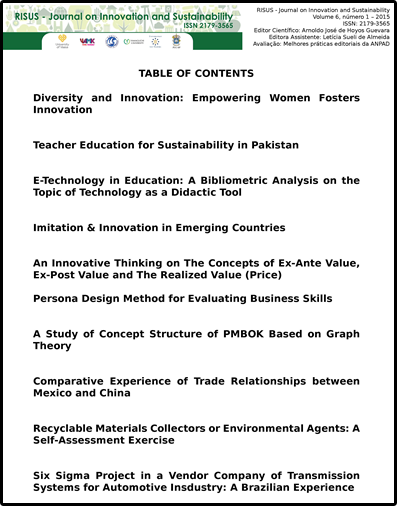Recyclable Materials Collectors or Environmental Agents?: A Self-Assessment Exercise
DOI:
https://doi.org/10.24212/2179-3565.2015v6i1p86-99Palavras-chave:
solid waste, selective collection residues scheme, work and social Psychology, sustainabilityResumo
This work presents results of a questionnaire which aimed to assess the profile of collectors ofrecyclable materials of ACIMAR – Association of Recyclable Materials Collectors of Itajubá, which is locatedin Itajubá, southern of Minas Gerais state. It is part of the program ‘Creation of a network of collectors ofrecyclable materials in the south of Minas Gerais’, funded by the Ministry of Education and developed by thePopular Cooperatives Technological Incubator of the Federal University of Itajubá (INTECOOP/UNIFEI), alongwith the Mayorship of Itajubá and the University Center of Itajubá (FEPI). The methodology was based on a fieldcampaign based on a questionnaire, which was used to interview 31 associates of ACIMAR. Queries were basedon: personal data; previous jobs; formal education; familiar structure; the motivations to become a recyclablematerial picker; the society’s perception on their work; previous capacitations; working time; financial gains;positive and negative aspects of their work, group relationships and life perspectives. Results suggest that 87%declared to have worked on other jobs, while 58% declared that these jobs were formal. Despite the socialsecurity aspects, they decided to work as recyclable material pickers, because there were no bosses. Genderdistribution is quite homogeneous, with 52% male and 48% female, what indicates an equilibrium not seen inother laboral sectors in Brazil. Some 32% are between 18 and 30 years old, while 29% are between 41 and 50years old. Around 74% declared to have incomplete formal education up to the fundamental level. Individualmonthly income are above R$ 600,00 (around US$ 270,00) for 56%. To all of them, their role is very importantas it helps in the city waste management and improves environmental conditions, while 62% considered beingcalled as environmental agents rather than collectors of recyclable materials, what suggests a quest for a newprofessional identity.Downloads
Publicado
Edição
Seção
Licença
Esta obra está licenciada sob uma licença Creative Commons Atribuição - No comercial - Sin derivaciones 4.0 Internacional
1.O(s) autor(es) autoriza(m) a publicação do artigo na revista;
2.O(s) autor(es) garante(m) que a contribuição é original e inédita e que não está em processo de avaliação em outra(s) revista(s);
3.A revista não se responsabiliza pelas opiniões, ideias e conceitos emitidos nos textos, por serem de inteira responsabilidade de seu(s) autor(es);
4.É reservado aos editores o direito de proceder ajustes textuais e de adequação do artigos às normas da publicação.
1.1 Copyright Statement
This journal is licensed under a Creative Commons Attribution-Non Commercial-No Derivers 4.0 International license.
1. The author (s) authorize the publication of the article in the journal;
2. The author (s) warrant that the contribution is original and unpublished and is not in the process of being evaluated in other journal (s);
3. The journal is not responsible for the opinions, ideas and concepts emitted in the texts, as they are the sole responsibility of its author (s);
4. The editors are entitled to make textual adjustments and to adapt the articles to the standards of publication.


